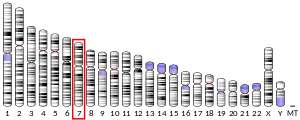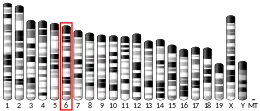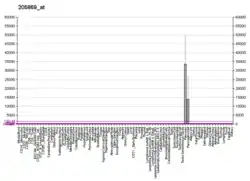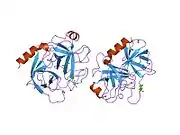Trypsin 1
Trypsin-1, also known as cationic trypsinogen, is a protein that in humans is encoded by the PRSS1 gene. Trypsin-1 is the main isoform of trypsinogen secreted by pancreas, the others are trypsin-2 (anionic trypsinogen), and trypsin-3 (meso-trypsinogen).
| PRSS1 | |||||||||||||||||||||||||||||||||||||||||||||||||||
|---|---|---|---|---|---|---|---|---|---|---|---|---|---|---|---|---|---|---|---|---|---|---|---|---|---|---|---|---|---|---|---|---|---|---|---|---|---|---|---|---|---|---|---|---|---|---|---|---|---|---|---|
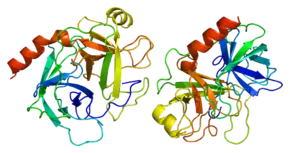 | |||||||||||||||||||||||||||||||||||||||||||||||||||
| |||||||||||||||||||||||||||||||||||||||||||||||||||
| Identifiers | |||||||||||||||||||||||||||||||||||||||||||||||||||
| Aliases | PRSS1, TRP1, TRY1, TRY4, TRYP1, Trypsin 1, protease, serine 1, serine protease 1 | ||||||||||||||||||||||||||||||||||||||||||||||||||
| External IDs | OMIM: 276000 MGI: 3687012 HomoloGene: 134623 GeneCards: PRSS1 | ||||||||||||||||||||||||||||||||||||||||||||||||||
| |||||||||||||||||||||||||||||||||||||||||||||||||||
| |||||||||||||||||||||||||||||||||||||||||||||||||||
| |||||||||||||||||||||||||||||||||||||||||||||||||||
| |||||||||||||||||||||||||||||||||||||||||||||||||||
| |||||||||||||||||||||||||||||||||||||||||||||||||||
| Wikidata | |||||||||||||||||||||||||||||||||||||||||||||||||||
| |||||||||||||||||||||||||||||||||||||||||||||||||||
Function
This gene encodes a trypsinogen, which is a member of the trypsin family of serine proteases. This enzyme is secreted by the pancreas and cleaved to its active form in the small intestine. It is active on peptide linkages involving the carboxyl group of lysine or arginine. Mutations in this gene are associated with hereditary pancreatitis. This gene and several other trypsinogen genes are localized to the T cell receptor beta locus on chromosome 7.[5]
Clinical significance
Its malfunction acts in an autosomal dominant manner to cause pancreatitis. Many mutations that can lead to pancreatitis have been found.[6][7][8][9] An example is a mutation at Arg 117. Arg 117 is a trypsin-sensitive site which can be cleaved by another trypsin and becomes inactivated. This site may be a fail-safe mechanism by which trypsin, when activated within the pancreas, may become inactivated. Mutation at this cleavage site would result in a loss of control and permit autodigestion, causing pancreatitis.[10]
See also
References
- ENSG00000204983 GRCh38: Ensembl release 89: ENSG00000274247, ENSG00000204983 - Ensembl, May 2017
- GRCm38: Ensembl release 89: ENSMUSG00000071521 - Ensembl, May 2017
- "Human PubMed Reference:". National Center for Biotechnology Information, U.S. National Library of Medicine.
- "Mouse PubMed Reference:". National Center for Biotechnology Information, U.S. National Library of Medicine.
- "Entrez Gene: PRSS1 protease, serine, 1 (trypsin 1)".
- Rebours V, Lévy P, Ruszniewski P (2011). "An overview of hereditary pancreatitiss". Digestive and Liver Disease. 44 (1): 8–15. doi:10.1016/j.dld.2011.08.003. PMID 21907651.
- Teich N, Mössner J, Keim V (1998). "Mutations of the cationic trypsinogen in hereditary pancreatitis". Hum. Mutat. 12 (1): 39–43. doi:10.1002/(SICI)1098-1004(1998)12:1<39::AID-HUMU6>3.0.CO;2-P. PMID 9633818. S2CID 45885044.
- Chen JM, Ferec C (2000). "Molecular basis of hereditary pancreatitis". Eur. J. Hum. Genet. 8 (7): 473–9. doi:10.1038/sj.ejhg.5200492. PMID 10909845.
- Gorry MC, Gabbaizedeh D, Furey W, et al. (1997). "Mutations in the cationic trypsinogen gene are associated with recurrent acute and chronic pancreatitis". Gastroenterology. 113 (4): 1063–8. doi:10.1053/gast.1997.v113.pm9322498. PMID 9322498.
- Whitcomb DC, Gorry MC, Preston RA, Furey W, Sossenheimer MJ, Ulrich CD, Martin SP, Gates LK, Amann ST, Toskes PP, Liddle R, McGrath K, Uomo G, Post JC, Ehrlich GD (1996). "Hereditary pancreatitis is caused by a mutation in the cationic trypsinogen gene". Nature Genetics. 14 (2): 141–5. doi:10.1038/ng1096-141. PMID 8841182. S2CID 21974705.
Further reading
- Chen JM, Ferec C (2000). "Gene conversion-like missense mutations in the human cationic trypsinogen gene and insights into the molecular evolution of the human trypsinogen family". Mol. Genet. Metab. 71 (3): 463–9. doi:10.1006/mgme.2000.3086. PMID 11073713.
- Chen JM, Montier T, Férec C (2001). "Molecular pathology and evolutionary and physiological implications of pancreatitis-associated cationic trypsinogen mutations". Hum. Genet. 109 (3): 245–52. doi:10.1007/s004390100580. PMID 11702203. S2CID 24099557.
- Howes N, Greenhalf W, Stocken DD, Neoptolemos JP (2005). "Cationic trypsinogen mutations and pancreatitis". Clin. Lab. Med. 25 (1): 39–59. doi:10.1016/j.cll.2004.12.004. PMID 15749231.
- Kandula L, Whitcomb DC, Lowe ME (2006). "Genetic issues in pediatric pancreatitis". Current Gastroenterology Reports. 8 (3): 248–53. doi:10.1007/s11894-006-0083-8. PMID 16764792. S2CID 23606613.
- Yamamoto KK, Pousette A, Chow P, et al. (1992). "Isolation of a cDNA encoding a human serum marker for acute pancreatitis. Identification of pancreas-specific protein as pancreatic procarboxypeptidase B." J. Biol. Chem. 267 (4): 2575–81. doi:10.1016/S0021-9258(18)45919-4. PMID 1370825.
- Pollard SR, Meier W, Chow P, et al. (1992). "CD4-binding regions of human immunodeficiency virus envelope glycoprotein gp120 defined by proteolytic digestion". Proc. Natl. Acad. Sci. U.S.A. 88 (24): 11320–4. doi:10.1073/pnas.88.24.11320. PMC 53126. PMID 1763044.
- Shieh BH, Travis J (1987). "The reactive site of human alpha 2-antiplasmin". J. Biol. Chem. 262 (13): 6055–9. doi:10.1016/S0021-9258(18)45536-6. PMID 2437112.
- Kimland M, Russick C, Marks WH, Borgström A (1990). "Immunoreactive anionic and cationic trypsin in human serum". Clin. Chim. Acta. 184 (1): 31–46. doi:10.1016/0009-8981(89)90254-4. PMID 2598466.
- Emi M, Nakamura Y, Ogawa M, et al. (1986). "Cloning, characterization and nucleotide sequences of two cDNAs encoding human pancreatic trypsinogens". Gene. 41 (2–3): 305–10. doi:10.1016/0378-1119(86)90111-3. PMID 3011602.
- Honey NK, Sakaguchi AY, Quinto C, et al. (1984). "Chromosomal assignments of human genes for serine proteases trypsin, chymotrypsin B, and elastase". Somat. Cell Mol. Genet. 10 (4): 369–76. doi:10.1007/BF01535632. PMID 6589790. S2CID 40599814.
- Merrill GA, Butler M, Horowitz PM (1993). "Limited tryptic digestion near the amino terminus of bovine liver rhodanese produces active electrophoretic variants with altered refolding". J. Biol. Chem. 268 (21): 15611–20. doi:10.1016/S0021-9258(18)82300-6. PMID 8340386.
- Rowen L, Koop BF, Hood L (1996). "The complete 685-kilobase DNA sequence of the human beta T cell receptor locus". Science. 272 (5269): 1755–62. Bibcode:1996Sci...272.1755R. doi:10.1126/science.272.5269.1755. PMID 8650574. S2CID 84766616.
- Gaboriaud C, Serre L, Guy-Crotte O, et al. (1996). "Crystal structure of human trypsin 1: unexpected phosphorylation of Tyr151". J. Mol. Biol. 259 (5): 995–1010. doi:10.1006/jmbi.1996.0376. PMID 8683601.
- Gu M, Majerus PW (1996). "The properties of the protein tyrosine phosphatase PTPMEG". J. Biol. Chem. 271 (44): 27751–9. doi:10.1074/jbc.271.44.27751. PMID 8910369.
- Christensen S, Valnickova Z, Thogersen IB, et al. (1997). "Assignment of a single disulphide bridge in human alpha2-antiplasmin: implications for the structural and functional properties". Biochem. J. 323 (Pt 3): 847–52. doi:10.1042/bj3230847. PMC 1218391. PMID 9169621.
- Dahlen JR, Foster DC, Kisiel W (1998). "Expression, purification, and inhibitory properties of human proteinase inhibitor". Biochemistry. 36 (48): 14874–82. doi:10.1021/bi970977p. PMID 9402754.
External links
- GeneReviews/NCBI/NIH/UW entry on PRSS1-Related Hereditary Pancreatitis
- Overview of all the structural information available in the PDB for UniProt: P07477 (Human Trypsin-1) at the PDBe-KB.
This article incorporates text from the United States National Library of Medicine, which is in the public domain.
